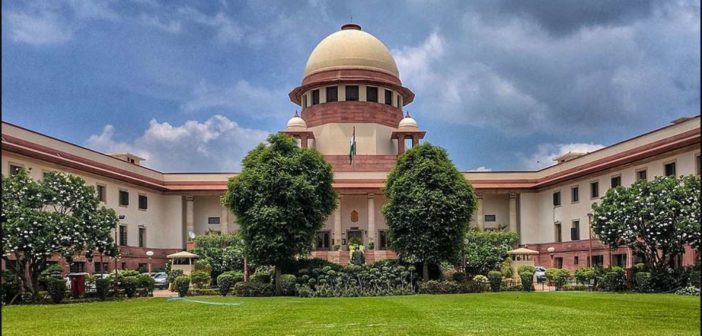In this week’s review of court judgements, we look at Supreme Court’s judgements on sexual harassment cases and guidelines to the High Courts regarding the early disposal of cases against MPs and MLAs, Orissa High Court’s judgement on husband as proxy for sarpanch wife and its impact on purpose of women reservation, Rajasthan High Court’s judgement on Maternity leave to surrogate mothers, Kerala High Court’s judgement on defections in democracy and Himachal Pradesh High Court’s judgement on contractual appointments by the State.
Supreme Court: There is a compelling need for expeditious disposal of cases on elected representatives; issues guidelines to High Courts regarding the same.
The Supreme Court, in Ashwini Kumar Upadhyay vs. Union of India & Anr., issued guidelines to the High Courts across the country for deciding on cases against elected representatives. It remarked that these cases have a direct bearing on political democracy, and it is necessary to ensure that these cases are decided on priority and expeditiously.
A three-judge bench of the apex court comprising Chief Justice DY Chandrachud, Justice JB Pardiwala, and Justice Manoj Misra were hearing a writ petition under Article 32 of the Indian Constitution seeking expeditious disposal of criminal cases against elected representatives of Parliament and legislative assemblies. The apex court, in Public Interest Foundation vs. Union of India directed that the trial shall be concluded as speedily and expeditiously as may be possible and in no case later than one year from the date of the framing of charges.
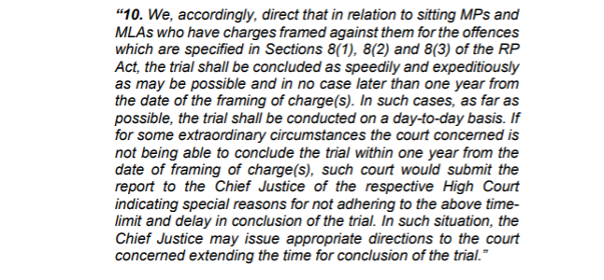
In the earlier stages of this case, the apex court called upon the Union Government, State Governments and High Courts to respond to the idea of setting up special courts and the financial implications involved in its implementation, based on the submission by the Solicitor General. After looking at the complexity, the court suggested that instead of setting up special courts, a specified court in each district, both at the sessions and magistrate level, be identified and earmarked for prioritized hearings of the subject cases. It asked the Governments to respond to this suggestion.
The apex court directed the High Courts to examine and constitute as many sessions and magisterial courts as possible for speedy disposal of cases, in the below priority order.
- Offences punishable with death/life against sitting and former MPs/MLAs
- Offences punishable with imprisonment up to 5 years or more
- Rest of the offences
Further, looking at the data, it is seen that there are as many as 5,175 subject cases pending as of November 2022. Of these, cases that are pending for more than 5 years are as many as 2,116 or more than 40% of such pendency. Looking at the data and information available, the apex court remarked that there are various factors that could influence the progress of the cases, and it becomes difficult to issue uniform guidelines for all states. Accordingly, the apex court left it to the High Courts to decide on the methods/measures that they think are relevant for expeditious disposal of cases. The court issued certain guidelines regarding the same.
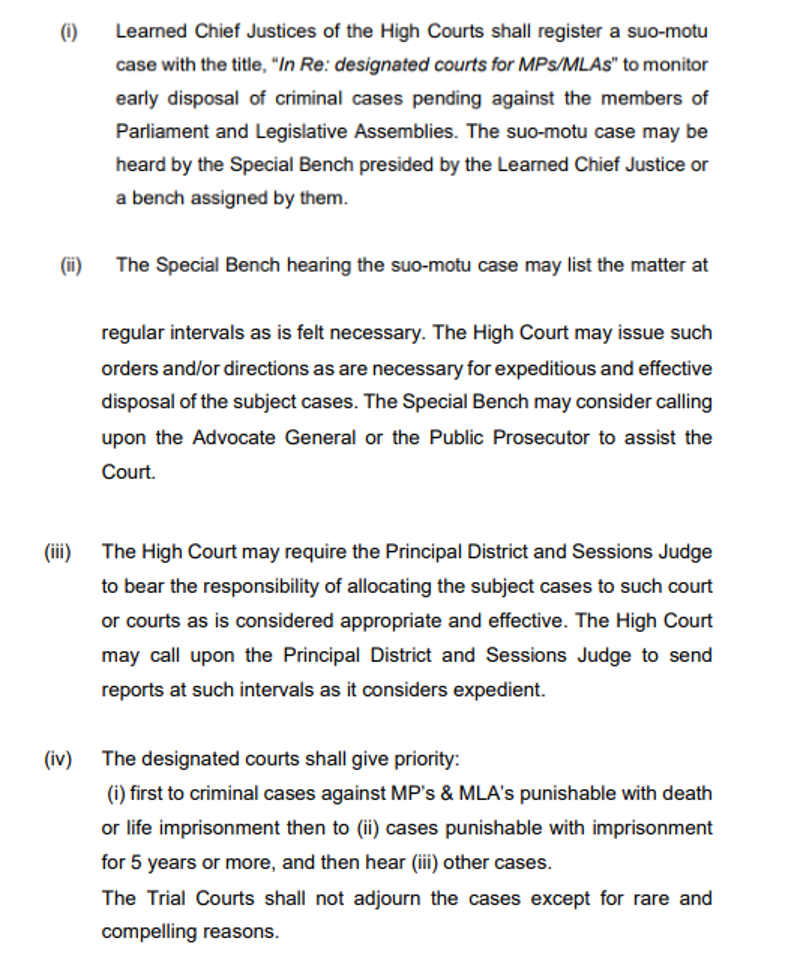
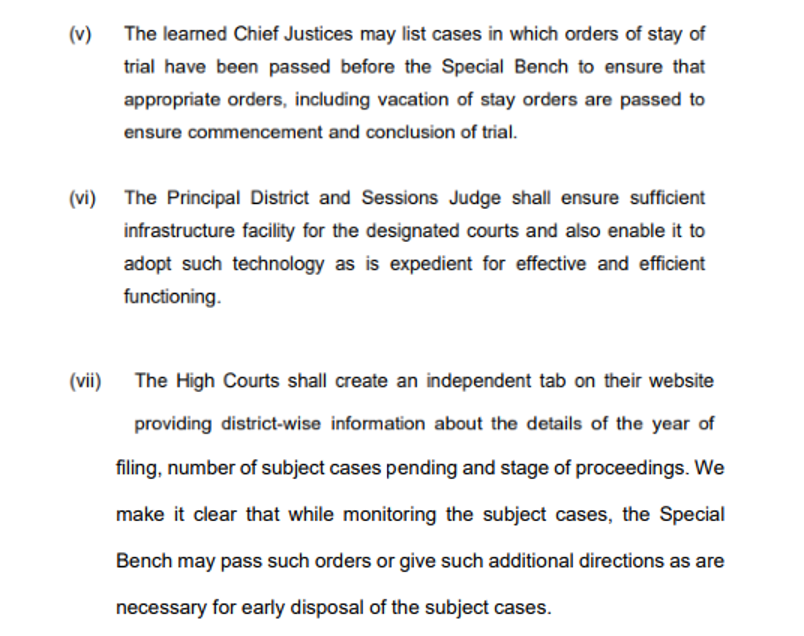
Accordingly, the writ petition is disposed of.
Supreme Court: Inquires in sexual harassment cases must be done keeping in mind broader possibilities and entire background of the case.
The Supreme Court, in Union of India & Ors. vs. Dilip Paul, held that courts must be cognizant to not get swayed away by the hyper technicalities and procedural deficiencies, but rather focus on the impact of the violation of such procedures on the inquiry.
This case involves a complaint of sexual harassment filed by a female employee against the respondent. The female employee filed an initial complaint of sexual harassment against the respondent. The complainant submitted a second complaint with additional allegations against the respondent. Two initial inquiries, a fact-finding inquiry, and a Frontier Complaints Committee inquiry, failed to substantiate the allegations. The Ministry of Home Affairs constituted the Central Complaints Committee to investigate the matter. This committee found the respondent guilty of sexual harassment. The respondent claimed that the allegations were false and were made because he had rejected the transfer application of the complainant. The respondent approached the Central Administrative Tribunal (CAT) seeking the cancellation of the Central Complaints Committee’s inquiry. CAT refrained from expressing an opinion as the disciplinary proceedings were still pending. The case moved to the High Court, which ruled that the Central Complaints Committee had overstepped its jurisdiction by considering the second complaint. The High Court stated that the committee’s role was limited to the first complaint, and it should not have considered the allegations in the second complaint. The High Court found that the Central Complaints Committee had taken on a prosecutorial role during the inquiry and that its jurisdiction was limited to the first complaint. The High Court also criticized the committee’s findings, characterizing the case as “No Evidence.” This is challenged before the Supreme Court.
The Apex court looked at the arguments from both sides. It framed four questions as below.
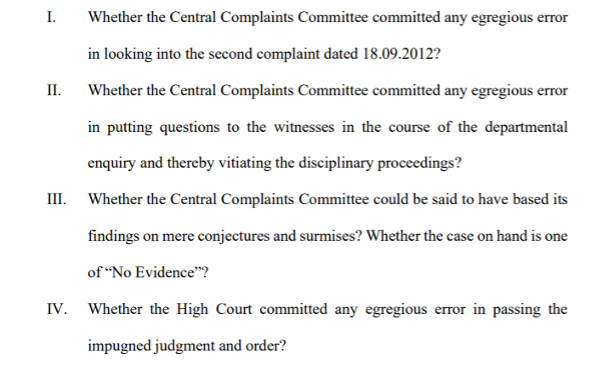
On the first question, the apex court held that when it comes to disciplinary proceedings, the inquiry authority and disciplinary authority in the exercise of their powers of judicial review should not sit in appeal and reappreciate the evidence or substitute its own findings. Regarding how courts should approach such cases, the apex court cautioned the courts of getting swayed away by procedural deficiencies and held that courts are obliged to rely on any evidence of the complainant that inspires confidence. The apex court in various other judgements remarked that all material that is logically probative to a prudent mind ought to be permissible in disciplinary proceedings keeping in mind the principles of fair play, as there is a power imbalance in sexual harassment cases.
The court found the High Court’s reasoning that the Central Complaints Committee was constituted on the basis of the first complaint, and therefore its scope is limited as erroneous, as the constitution of the committee was based on a prior standing order and not just the complaint.
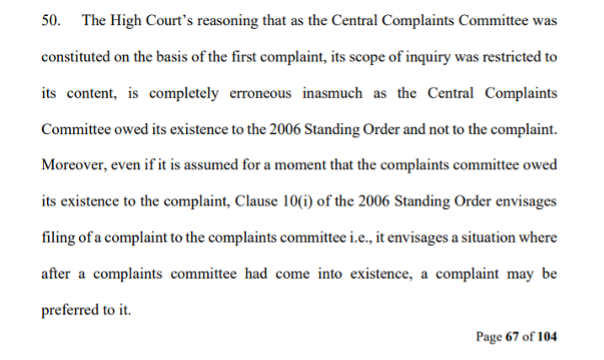
On the question of the Central Complaints Committee questioning the witnesses, the apex court wondered how the complaints committee after being equated with a judge in a judicial proceeding is denied such privilege. The primary objective is to unearth all the facts relevant to the case and provide ample opportunities for all stakeholders keeping in mind the principles of natural justice.
On the question of the case being an example of a case with ‘no-evidence’, the apex court remarked that the material on record reasonably substantiates the allegations of sexual harassment levelled by the complainant. It was not considered by the High Court as it was limited by the scope of judicial review. Non-availability of call records as material evidence was rightly noted by the Committee since there is a significant time lapse in the complainant registering a complaint. Hence, this is not a case of ‘no evidence’.
Based on the conclusions derived, the apex court held that the High Court committed an egregious error in passing the impugned judgment and order. Accordingly, the appeal is allowed.
Orissa HC: Husband as Proxy Sarpanch cannot be allowed to hijack the role, responsibility, & function of the Sarpanch; defeats the entire purpose of women reservation.
In Manoj Kumar Mangaraj vs. The Collector, Kalahandi & Ors., the Orissa High Court held that husbands working as proxies for their sarpanch wives defeats the entire purpose of women reservation. Such a system would put the grassroots democracy in peril.
The single bench judge comprising Justice Sanjeeb Kumar Panigrahi was hearing a writ petition filed by Gaan Saathi whose performance of duty was allegedly obstructed by the husband of the Sarpanch. The petitioner claimed that the sarpanch’s husband requested him to falsely register the presence of 30 MGNREGA job card holders who had not undertaken any work. As the petitioner was unwilling to comply with this demand, he was subsequently barred from serving as a Gaan Saathi in the gram panchayat.
Feeling aggrieved, the petitioner initially sought resolution by approaching the Collector, Kalahandi, to address his concerns. However, the Collector did not promptly address the matter, leading the petitioner to take the matter to the High Court under its writ jurisdiction.
Upon hearing the arguments from both parties, the court remarked that the present case is a classic example of the phenomenon of ‘Sarpanch Pati’, where the male spouse of the Sarpanch wields actual political and decision-making power. Such a proxy system defeats the purpose of reservation for women in the Panchayati Raj Institution.
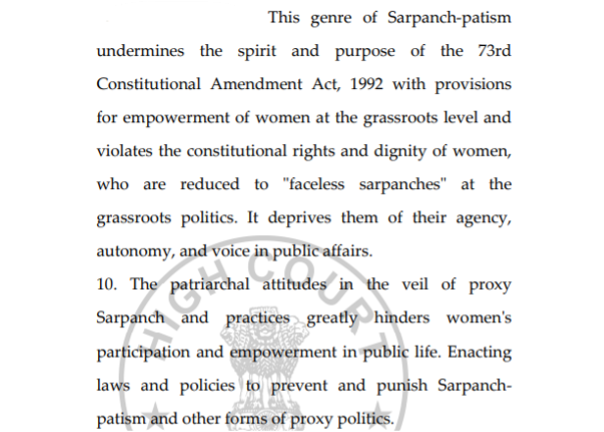
Accordingly, the court remarked that the Government through appropriate Department has to deal with such matters seriously, or else, the grassroots of democracy would be in peril. The Petitioner was permitted to discharge his duties as GAAN SAATHI.
Rajasthan HC: Differentiating natural biological mother and surrogate mother is an insult to motherhood; not granting maternity leave is discriminatory.
The Rajasthan High Court, in Chanda Keswani vs. State of Rajasthan., remarked that there should be no differentiation between a natural biological mother and a mother who has begotten a child through surrogacy when it comes to granting maternity leave. The court appears to assert that both types of mothers are entitled to equal maternity leave benefits.
A single judge bench of Justice Anoop Kumar Dhand was hearing a petition regarding maternity leave for surrogate mothers. In the given case, the petitioner, after undergoing the process of surrogacy, gave birth to twins. Subsequently, she applied for maternity leave with the State authorities to care for her newborns. However, the State authorities denied her request through an order dated 23 June 2020. The refusal was based on the assertion that there is no provision in the Rajasthan Service Rules, 1951, for granting maternity leave to a mother who has children through the surrogacy process. The petitioner has approached the Court by filing a petition under Article 226 of the Constitution of India.
The counsel for the petitioner argued that the rules were framed in 1951, and during the relevant time, the parents did not utilize the procedure of surrogacy. However, over time and with advancements in medical science, parents now have an alternative method of having children through surrogacy, particularly if they are unable to have children through conventional means. However, the counsel for the state contended that since there is no existing rule for granting maternity leave in the context of surrogacy, the petitioner does not have a legal entitlement to seek relief from the court.
Having heard both sides, the court looked at the relevant legal position.
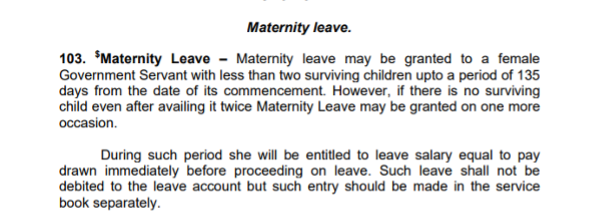
The court observed that before the substitution of Rule 103 in the Rules of 1951, there existed a provision for granting ‘maternity benefits’ under the Maternity Benefit Act, 1961 (referred to as ‘the Act of 1961’). This provision applied to women employed in specific establishments for a defined period before and after childbirth. Section 3(b) of the Act of 1961 specified that the term “child” includes “a still-born child.” However, it is noted that neither the terms “mother” nor “child” have been explicitly defined within the Rules of 1951 and the Act of 1961.
Further, the court, relying on multiple judgements, remarked that the right to life under Article 21 of the Constitution of India encompasses not only the right to motherhood but also the right of every child to full development. The contention is that if the government can extend maternity leave to an adoptive mother, it would be improper and unjust to deny the same benefit to a mother who gives birth to a child through the surrogacy procedure.
Interestingly, the court also relied on other legal statutes for its reasoning. With the recognition of surrogacy by the Legislature through the enactment of the Surrogacy Regulation Act of 2021, where a female can now become a mother through surrogacy, she should not be denied the benefit of maternity leave following the birth of the child through the surrogacy process. In other words, the recognition of surrogacy as a legitimate means of becoming a mother implies that women using surrogacy should be entitled to maternity leave, similar to mothers who give birth through conventional means. Denial of such benefits is an insult to motherhood.
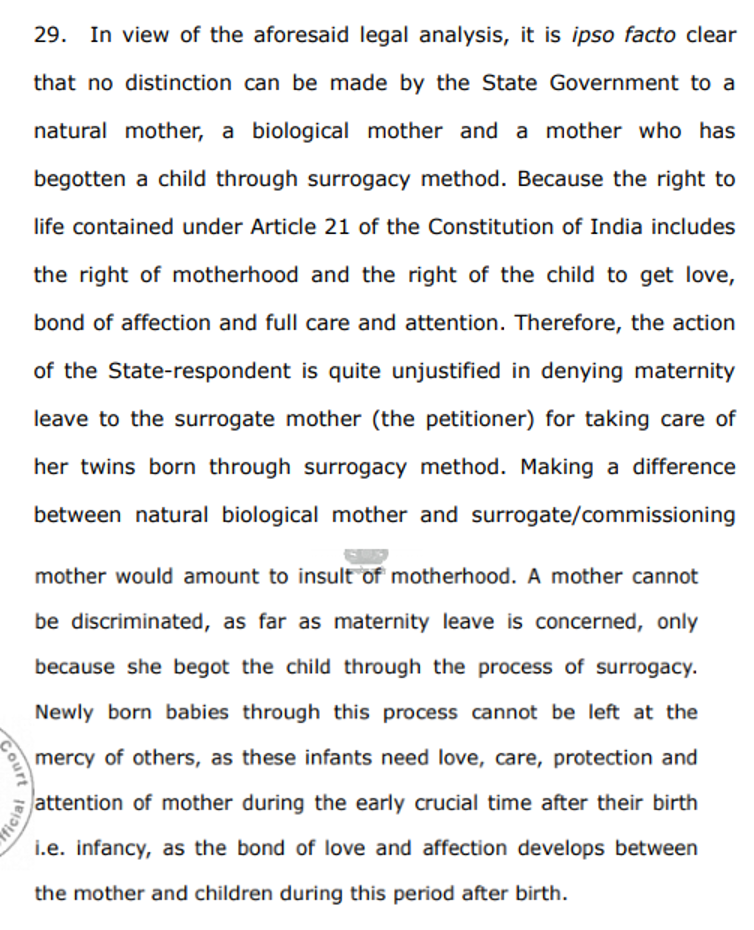
Accordingly, the court ordered the respondents to sanction maternity leave of 180 days to the petitioners.
Kerala HC: Defections by elected representatives have been a bane of the Indian democracy, need to contemplate on including stringent financial penalties for acts of defection.
The Kerala High Court, in Deepak K. vs. The Kerala State Election Commission & connected case, remarked that despite the presence of anti-defection law, unscrupulous persons indulge in baleful acts of defection and the burden on the exchequer is immense due to the inevitable bye-elections. The Court further remarked that the time has come to contemplate including stringent financial penalties for acts of defection.
The Single Judge bench comprising Justice Bechu Kurian Thomas was considering the issue of disqualification due to the defection of a candidate by voluntarily giving up membership of a political party under whose banner the candidate stood for elections and won. The elected representative was a member of the Kerala Congress (M) P.J.Joseph [KCMPJJ] under UDF coalition, whereas after winning the election, the candidate gave up his membership in KCMPJJ and joined Kerala Congress (M) [KCM] which is a LDF coalition. It was alleged that he suffered disqualification under Section 3(1) of the Kerala Local Authorities (Prohibition of Defection) Act, 1999 . The Election Commission of the state stated that there was no cause of action for disqualification and dismissed the petitions. Aggrieved by this, petitioners approached the High Court.
The High Court observed that political defection betrays not only the party under whose banner the election was won but also the public who voted for the candidate.
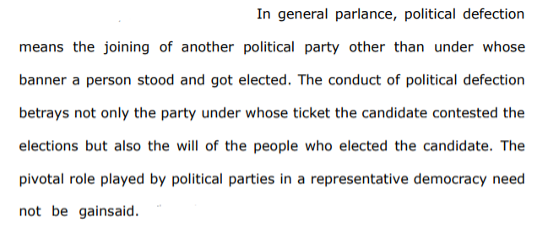
Looking at the material evidence and the relevant sections of the act, the court concluded that the elected representative would attract disqualification. The court noted that any methods adopted by the defectors to escape the anti-defection law should be wrecked out and must be dealt with sternly. It further remarked that if, in a context, the purpose of the statute will be expressly defeated by a rigid adherence to the definition, a departure can be adopted.
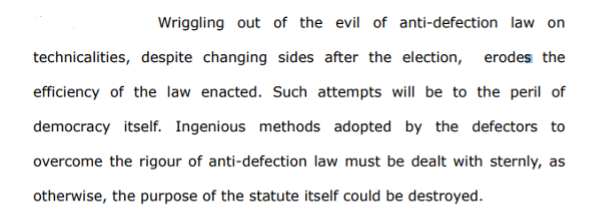
Accordingly, the order of Kerala State Election Commission is set aside.
Himachal Pradesh HC: State cannot be permitted to act as an exploitative master by cleverly devising a method to deprive the employees from their lawful and just benefits emanating from the services rendered by them.
In Chaman Lal & others vs. State of H.P. & others, the Himachal Pradesh High Court remarked that the State being a model employer cannot be permitted to use exploitative employment practices, and the State is expected to be a guardian of citizen’s rights.
In the case before the bench of Justices Vivek Singh Thakur and Bipin Chander Negi, the petitioners were individuals appointed as Tehsil Welfare Officers on a contractual basis by the Department of Social Justice and Empowerment of the Government of Himachal Pradesh in May 2010. Despite adhering to the prescribed rules for recruitment, the state opted to provide only contractual appointments for an initial five-year period, resulting in the petitioners being deprived of regular employment benefits and seniority.
Consequently, the petitioners approached the court seeking various reliefs, which included the counting of their contractual service for purposes such as annual increments, seniority, and pensionary benefits. The case revolves around the contention that, despite following recruitment rules, the contractual nature of their appointments has led to the denial of certain employment benefits, and the petitioners are seeking redress through legal intervention.
The court, having heard both sides, remarked that the use of clever strategy to avoid rightful benefits to the employees is condemnable. Such tactics are exploitative in nature and against the rights of the citizens.
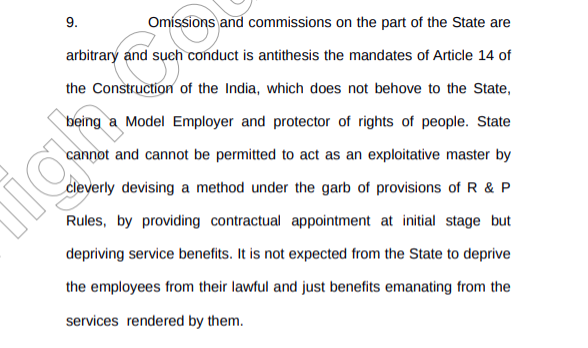
Further, the situation described indicates that it’s not a scenario where employees were urgently hired for a temporary increase in workload due to an unforeseen circumstance. Instead, the recruitment was for permanent sanctioned posts created to address the ongoing and continuous workload. Just to avoid liability, the State has adopted the exploitative policy of contractual employment, which is not fair.
Accordingly, the court held that the petitioners are entitled to all consequential benefits from the date of the initial appointment.


